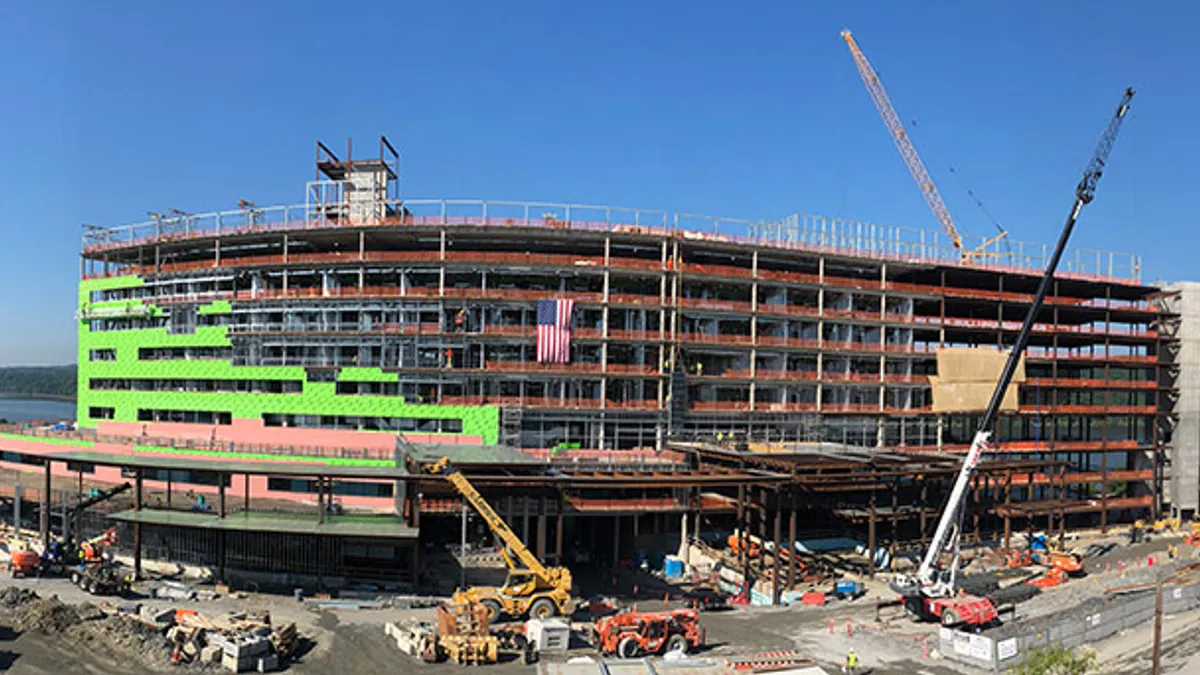A New Jersey plumbing company working on a medical center expansion in Poughkeepsie, New York, is suing general contractors Walsh Group and Consigli for $5.5 million in past due payments and $16.4 million in punitive damages stemming from changes and cost overruns allegedly caused by miscommunication around the design of the building.
Fairfield, New Jersey-based Brian Trematore Plumbing & Heating Inc. sued the Walsh-Consigli JV on Oct. 23 in White Plains federal court, saying that its work on the $545 million Vassar Brothers Medical Center was delayed due to the "defective design" of the project.
In total, the lawsuit claims the plumbing subcontractor submitted 390 requests for information (RFIs) and 109 change orders that can be "traced back to the incorrect and incomplete design provided by the owners," of which many went unanswered and unresolved, the suit says. These problems "had a rippling effect on work sequencing, scheduling and coordination, constantly interfering with the plaintiff's day to day work," it said.
Changing plans
When Trematore Plumbing was awarded the $17.9 million plumbing contract in September 2016, the plan was for a seven-story, 696,000-square-foot project encompassing hundreds of patient rooms, critical care rooms, an emergency department and surgical suites. In February 2018, owner Health Quest expanded the plan to eight stories and 752,000 square feet. The lawsuit refers to a planning board meeting in which the project was described as Poughkeepsie's "largest ever." The suit alleges that Trematore Plumbing did not receive an updated schedule or design plan at that time.
Problems on the project became apparent early on, the suit alleges. Trematore hired an independent expert who said that the design — which was provided to the owner by architecture firm CallisonRTKL — omitted important elements of the project that hampered Trematore's progress. According to the lawsuit, the sub asked repeatedly for troubleshooting on the design, but had no communication with RTKL at all.
Checking BIM
"The independent expert determined that the project design provided was not at a sufficient level of development to construct the systems as shown in the BIM provided," it reads.
Other problems mentioned in the lawsuit include:
- water pipes and medical gas piping did not fit in the allotted space
- the location of toilets was not properly coordinated with the design of steel framing
- an ionization system to prevent biological hazards was left off of the original design
- a lack of water on site until August 2019 required the plumber to perform smoke testing instead of water testing on the plumbing system
- numerous pipe hangers were installed, relocated and reinstalled three times on several floors, resulting in $133,000 worth of extra work
- various HVAC systems and electrical components in the ceilings had to be reinstalled
- the work of other subcontractors conflicted with the installation of piping
The complaint notes that Walsh-Consigli accused the plumbing company of failing to perform work as required. Walsh Group public relations director Pete Doherty, who is handling media inquiries for the project, declined to comment on the lawsuit.
What next?
Although the project's original completion date of August 2019 has been pushed back to February 2020, Trematore said in the lawsuit that it has not received an updated schedule related to the extended timeline.
While general contractors and their subs usually try to work out differences outside of the courtroom, sometimes either party sees a lawsuit as the best way to resolve an issue. For instance, subcontractors working on the $1 billion Oceanwide Plaza project in downtown Los Angeles have filed $98.6 million worth of mechanic's liens against developer Oceanwide Holdings.
Many times, the problem stems from disagreements over payments, according to a new study that found that slow payments are costing general contractors and subcontractors $64 billion a year. This is a $24 billion increase from the 2018 study from construction finance platform Rabbet, formerly Contract Simply, as the company added general contractors to the respondent mix.
Rabbet found that the 51-day average payment turnaround is particularly hard on labor- and material-intensive subcontractors. More than 60% of subcontractors said they have chosen not to bid on certain projects if the owner or general contractor has a reputation for paying late, and 72% said they would offer a 1% to 5% discount for quicker payments, saving the construction industry approximately $44 billion.
Only 39% of subcontractors reported that they are able to cover the late payments with cash on hand, forcing them to incur the costs associated with using lines of credit, credit cards, personal savings and even retirement savings.















